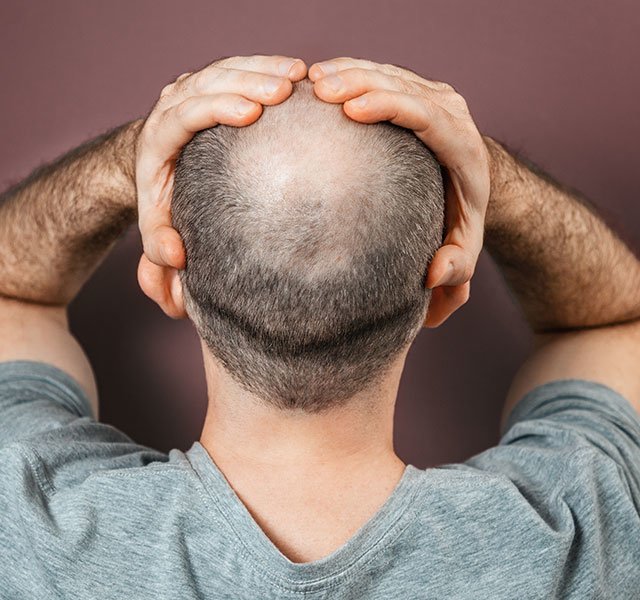If you're a man approaching middle age, the threat of hair loss may be looming. But here's the thing: All men (and women) lose hair. Men of a certain age are especially prone to hair loss, at least from the top of their heads.
"Male pattern baldness, or gradual thinning of hair on the scalp, is typically hereditary," says Ben Friedman, M.D., a dermatologist for Henry Ford Health. "It happens as hormone levels change over a man’s lifetime, particularly starting in middle age."
Other factors that contribute to hair loss include illness, aging, even overly aggressive grooming habits.
Common Male Pattern Baldness Myths
More than half of all men over the age of 50 have some degree of male pattern baldness, according to the U.S. National Library of Medicine (NLM). But despite the large number of men who are losing their hair, there are a lot of myths and misinformation about how and why hair loss happens.
Here are seven misconceptions about baldness that you can put to bed.
- Wearing hats leads to baldness. You don't need to offload your favorite fedora just yet. There's zero evidence to suggest that wearing hats — even on a daily basis — leads to hair loss or hair follicle damage. "Hats that are dirty, however, can lead to an infection, which can increase the odds that you'll lose some hair," Dr. Friedman says. "So it's a good idea to wash and rotate your hats frequently."
- Baldness is your mother's father's fault. Moms' lineage has long been blamed for male pattern baldness, but the reality is, hair loss is a genetic trait you can inherit from either parent. So look at both parents, check out your siblings and even pay attention to first cousins. If baldness is a recurring trait, you may want to pay closer attention to your mane.
- "Natural" supplements can promote hair regrowth. "No amount of vitamins or minerals can help regrow hair," Dr. Friedman says. That rule applies to herbs like stinging nettle and saw palmetto, too. But eating a healthy diet and avoiding nutrient deficiencies can help ensure you keep the hair you already have.
- Hair loss means you're carrying around too much testosterone. The amount of hair on your head has very little to do with the testosterone circulating in your bloodstream. Instead, male pattern hair loss comes down to hair follicle sensitivity to a hormone called dihydrotestosterone (DHT).
- Stress speeds up male pattern baldness. True, traumatic events and emotional overwhelm can trigger temporary hair loss, but this type of hair loss is not the same as male pattern baldness, which is permanent. With trauma-induced hair loss, your hair follicles press pause. After the threat has passed, they resume their "normal" cycle again.
- Baldness happens from too much sun exposure. While there are plenty of reasons to steer clear of the sun, the threat of going bald is not one of them. Your follicles continue to function with ultraviolet radiation from the sun, but your hair shaft may degrade and become brittle over time.
- Hair restoration treatments don't work. The Food and Drug Administration-approved medication, Finasteride (Propecia), is one effective method for preventing further hair loss. The drug works by blocking an enzyme that changes testosterone to DHT in the hair follicles. "It works best among men whose hair is just beginning to thin," Dr. Friedman says. The rub: If you stop taking the medication, your hair loss will continue. Rogaine (minoxidil), a topical medication that you apply twice daily, can work, too — and it's available without a prescription. Although an expensive procedure, transplant of hairs from the back of the head to the front can also be effective. These hairs are not under the same influence of DHT and can persist over time.
What To Do Before You Go Bald
Hair loss happens — and middle-aged men aren't the only victims. In fact, hair loss can strike boys during their late teens and it's not that uncommon among 20- and 30- year-olds. Unfortunately, the earlier male pattern baldness sets in, the more likely it will be severe.
While there's no cure for a shiny scalp, there are things you can do to stall hair loss. "Once hair loss begins, it doesn't stop," Dr. Friedman says. "But if maintaining a full head of hair is important to you, it's important to take action as soon as you notice your hair thinning."
Talk to your doctor about available treatment options, so you can weigh the risks and benefits of each approach. Whether you choose medication or surgery, you may be able to turn back the clock on your head with a little medical assistance.
Subscribe today to receive weekly emails of our latest tips.
To find a doctor or dermatologist at Henry Ford, visit henryford.com or call 1-800-436-7936.
Dr. Ben Friedman is a dermatologist specially trained in dermatopathology. He sees patients at Henry Ford Cancer - Detroit and Henry Ford Medical Centers - Farmington Road and New Center.



